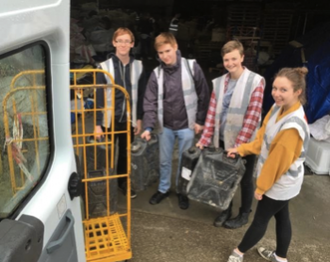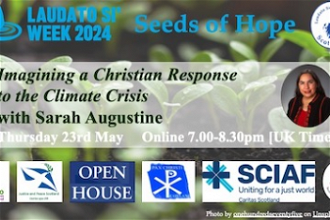Reflections from visit to Calais - #Iamhumantoo

There are between 50 and 60 arrivals EVERY DAY in Calais at the moment - that is 300-400 a week, around 1500 a month. And it is only June.
The people looking after the aid warehouses are anxious - ever since two thirds of the Camp was bulldozed in January/February there has been a marked drop in media and public interest.
The donations have reduced, and the warehouses are emptying - people think Calais has been "sorted." In reality there are again well over 5,000 people at the camp - though now crammed into a smaller space - and many thousands more spread along the coast between Belgium and Dunkirk.
New arrivals are traumatised; the journey has been long, at times very hostile and difficult. A volunteer I met spoke of a recent conversation with a new arrival; he had been one of just three survivors after a boat carrying 100 people, including members of his family, had capsized in the Mediterranean. There are an increasing number of teenagers arriving unaccompanied at the camp - separated from family on long and difficult journeys; indeed it is often unclear whether or not their family are still alive.
When we arrived in Calais - after noticeably more rigorous searching of all vehicles in Dover - we found a good team of volunteers at the Care4Calais warehouse. We had brought with us 1200 pairs of men's underpants, 200 blankets, and 47 twenty litre water containers. These are essential when there are just 50 or so taps serving such a large group of people; the taps can be some distance from people's tents or huts. Hygiene is already a major problem at Calais, due to the lack of washing facilities.
The volunteers have come from several countries, and for many reasons. We met Ben, a second year Languages and International Relations student at Exeter. "I was on a University ski trip at Easter," he said. "The coach stopped about 5am and I woke up to see all the blue flashing lights, heard sirens going and saw lines of police. It all looked so brutal. So then I read more about it - and now I have come for a week."
Volunteers are very welcome - and the longer they can stay, the better; experience in the camp is quickly gained, and readily shared. Another volunteer, Connor, reflected on the days he had spent. "It is a very particular kind of aid here. Normally aid is either very basic survival rations, or helping rebuild communities. But in Calais there is something more than basic survival - and something that is not able to be a permanent community. Build anything too permanent and it will be bulldozed, anyway."
He is right - and so it is a limbo - and for the people it is such awful, appalling boredom.
These are creative people, who have often had to flee professional jobs and good lives. They have energy, and gifts and talents - and they are traumatised and scarred by what they have experienced both in their home countries, and in their journey to escape. Months and months in Calais do not help them.
We dropped the things we had brought at the warehouse, and swiftly became part of two teams heading into the camp; for Katie and Claire, they were heading to an art project to make kites. For myself, Liam and Conor, a distribution of trousers. As we were briefed, we were sensitively reminded it was Ramadan. Many of the refugees are Muslim; respecting their fast, we also would not drink water or smoke in front of the refugees. We were involved in a trouser distribution a few months ago, and I wrote about it then; it really is a forceful reminder of the very great hardships there are as a refugee - hardships we may not consider or even notice, perhaps, until they became realities for us.
In Calais people are hungry but no-one is starving, shelter is often very basic but no-one is sleeping outside, people are ill and in pain but there is limited provision for the most serious medical emergencies at a nearby hospital. And yet there is a different kind of hardship in this - and the trouser distribution highlights it well. Think about when you go shopping. You have a choice of shops, and online. You can try things on. You can look at different styles, sizes and colours. And probably if you are more than three or four minutes queuing for someone to help you at a fitting room or to serve you at a till, perhaps a certain impatience sets in?
Of course, the trousers we were distributing were gifts - there was no charge, obviously, and in fact there was a great deal of appreciation and thanks offered. But imagine what it would do to you, over a period of months, if all your clothes were handouts, if you had no great opportunity to pick something for yourself, to make any choice? Picture this not only with your clothing but with the food you ate as well, with the brand of toothpaste you used, the type of soap or deodorant. What does it do to any of us for us to have no personal choice about such things?
For many months. As we began the distribution, at first glance it looked like we had quite a good selection, 300-400 pairs, ranging from waist size 28-34 - so about sixty in each size. But trousers don't only vary by waist size, but by leg length, so then there were maybe 20 of the right combination of size and length. This was fine for the first handful of people in the line - they had some choice. But very, very rapidly the 28" waist, small leg sizes diminished. The line for the trousers was long - people need these items, as the rain and mud quickly ruins clothes when there is nowhere to properly wash and dry them. But after barely half an hour we were having to send people away with trousers that were too big, or too long for them, encouraging them to roll up the legs, or use pieces of string for belts. The distribution continued for three hours - as ever, and even with size mismatches and no real choice of style or colour, the refugees were humblingly grateful for all that they received. By the end, with no trousers left, we were giving out socks and shampoo so at least those who had queued for so long had something. But it all felt rather inadequate and very sad; how have we come to a point where fellow human beings are completely reliant on basic charity, just 22 miles from England and two miles from one of the largest passenger and freight ports in Europe?
For Katie and Claire, their experience was very different. All the time volunteers encounter refugees who have great skills - for they are skilled, creative people. Once noticed, the volunteers try to help the skills get used, for the good of the camp. And so in this case an Afghan Refugee with an amazing skill in kite-making had been spotted and given a little project to be able to teach others how to make kites, and fly them. As kites can be made from cast off bits of wood and materials it does, in a rather poignant way, also suit the circumstances of Calais. For Afghan refugees - where kite flying is a fiercely competitive local and national sport - it also gives a little taste of home. Above all, it relieves the hours and hours of tedium and boredom. Katie and Claire had a wonderful afternoon - the kites were also being created to be part of an art project, so they were being brightly and colourfully decorated. The decorations included signatures - and Katie and Claire were both deeply moved when they noticed one of the refuges had added the hashtag #iamhumantoo.
The refugees were very friendly, they said, and even without much of the same language they had shared laughter and stories - they had been taught to count in Afghan, and much more besides. It was a generous-hearted, generous-spirited human encounter; if only everyone in the UK could come and make kites with the refugees, how different could perceptions be! The day had swiftly passed, and it was already nearly 6. We had used the minibus to bring in the teams of volunteers, so we travelled back to the warehouse and from there to the ferry.
As ever, leaving Calais there were stories to tell of joyful encounters, and a great sense of both sadness and powerlessness that we were leaving people for another night in the "Jungle." There had been an illuminating insight when we were stopped at the entrance to the camp earlier in the day; the policeman asked where we were from. "Care4Calais" I replied, to which his response was "Care for Calais - for who in Calais? For the people of Calais?" He was polite, but there was a clear sense of frustration in his question, and it is understandable - this has gone on now, at this scale, for over a year.
The charity volunteers are drained, the police are drained, the refugees are drained. My French was not good enough to even begin to share with that policeman all that is in my heart - I feel deeply for the police as well as for the refugees - so I just smiled at him and said, "We are caring for everyone, as best we can." I think he understood - he didn't arrest me, anyway, though my French accent alone is probably a criminal offence.
In seriousness, as I pray about all this I pray for everyone involved - the refugees, the volunteers, and the police. And I pray for the politicians, for the large charities with a depth of money and resources, and for church leadership - at some point surely someone with the right voice, and the right convictions, will speak into this situation in a way that is heard, in a way that changes hearts and minds, so as to give hope, courage and understanding to those with the power to give the refugees the welcome and the new beginnings that they need and deserve.
That hashtag is indeed a poignant cry from the heart - We travel from Basildon approximately once a month with aid; you can read all the reports back to September 2015 at www.basildoncatholics.org. As ever, thank you to all who have donated so far. Financial donations mean we can buy large numbers of the same item, at wholesale rates, which is the best way to supply aid in terms of both practicality and value.
Cheques can be made payable to "Our Lady and All Saints", and posted to: Fr Dominic Howarth, Calais Appeal, Holy Trinity Church, 71 Wickhay, Basildon SS15 5AD. Many, many thanks for any support that you can give. To set up your own project, or to volunteer at the Camp, seek advice - please don't just turn up at the Camp. Contact Seeking Sanctuary (migrantsupport@aol.com) or Care4Calais via Facebook and they will help you.


















